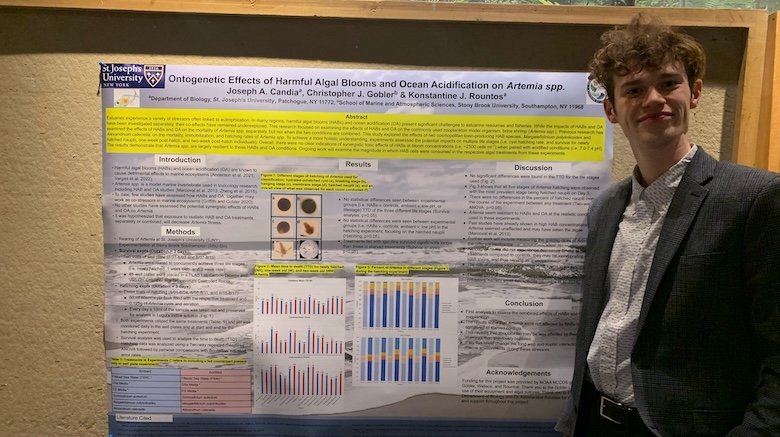SJNY senior Joe Candia ’24 has taken advantage of the many opportunities provided to St. Joseph’s students for hands-on learning.
After spending last summer as a research student with Konstantine Rountos, Ph.D., associate professor of biology, the Long Island Campus biology adolescent education major presented his thesis research at the 2024 winter meeting of the Southern New England Chapter of the American Fisheries Society hosted at the University of Connecticut.
Candia’s thesis research focused on how harmful algal blooms (HABs) and ocean acidification (OA) could potentially work together to decrease the fitness of a marine zooplankton species, Artemia spp. (brine shrimp). Together with Dr. Rountos, he chose this area because of zooplankton’s importance as a link in marine food chains, meaning the loss or great decrease in their population could create ripple effects through the rest of the food chain.
“Presenting at the conference was eye-opening to my future as a researcher,” Candia said. “It was very different from previous conferences I attended because this was focused on one specific group of like-minded people who made me feel at home while I presented.
“The interactions I had with everyone, including the judges and other presenters, showed me how kind the world of science really is,” he added.
Last summer, Candia was picked to complete his thesis research under Dr. Rountos, and served as his undergraduate assistant on a NOAA-funded project to determine how harmful algal blooms (HABs) in New York waters respond to coastal acidification, and how current and future climate change conditions affect them.
“While my research in the lab focused on zooplankton, Dr. Rountos’ research focused on larval forage fish,” said Candia. “Together, our research could show the need for action to be taken to prevent HABs and OA from increasing in their threat level.”
Candia’s research included conducting two types of experiments on various life stages of brine shrimp. He is currently working on more data analysis to see if there are any significant effects of these stressors.
“Joe is one of the top students that I have taught here in the Department of Biology,” Dr. Rountos said. “His enthusiasm, curiosity and determination in the laboratory for biological research particularly stand out.”
Candia is vice president of the Biology Club, and a member of the Green Team and Orientation Team. He is applying to graduate schools in marine science.
Inspired by his professors at St. Joseph’s, he would like to one day obtain a Ph.D. in Marine Biology.
“I would like to be a professor of marine biology and also conduct research for a great amount of time as well,” he said. “I plan on focusing my research efforts on shark biology and conservation to have a positive impact on this amazing group of organisms.”
Candia added that his time at St. Joseph’s has had a great impact on his career choice.
“After spending the last four years of my life in biology lectures and labs, I rediscovered the passion I had for marine biology that I have always had but never had the courage to pursue,” he said.


